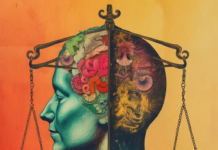A new article, published in the American Journal of Community Psychology, discusses how elements of neoliberalism and hyper-individualism erode the core tenets of a healthy society, damaging our personal and societal well-being.
Isaac Prilleltensky, a community psychologist at the University of Miami, employs a philosophical exploration of what it means to “matter” and claims that we must change the structures and environments that currently prioritize “me” over “we.” If we do not, the United States will continue to see a decline in mental health and wellness. Prilleltensky writes:
“If we want everyone to matter, we must foster a We Culture and reject politics that use and abuse mattering…we should embrace movements that seek to balance feeling valued with adding value to self and the community.”
 Researchers have previously connected measures of individualism, pressures to succeed, and relative inequality to decreased mental health and wellness, especially for young people. Prilleltensky, in his latest article, titled “Mattering at the Intersection of Psychology, Philosophy, and Politics,” explains, philosophically, how this a “Me Culture,” rooted in neoliberalism, corrodes mental health.
Researchers have previously connected measures of individualism, pressures to succeed, and relative inequality to decreased mental health and wellness, especially for young people. Prilleltensky, in his latest article, titled “Mattering at the Intersection of Psychology, Philosophy, and Politics,” explains, philosophically, how this a “Me Culture,” rooted in neoliberalism, corrodes mental health.
In contrast, Prilleltensky explores how We Culture is more beneficial to our mental health. In short, a We Culture seeks to ensure that everyone “matters.” That is, that everyone can add value and feel valued. Dissimilarly, our current Me Culture, allows only some to add value, only some to feel valued, and only a select population to add value and feel valued.
Mattering is a fundamental human need; the experience of mattering promotes both health and happiness. For someone to feel as though they matter to their community and themselves, they must know that they can add value to others’ lives and feel valued by those around them.
Prilleltensky employs philosophical argumentation to claim that individualism and Me Culture harm our mental health.
- First, he claims that mattering is a need that consists of feeling valued and adding value.
- He then argues that the need to feel valued derives from three motives: survival, social, and, most importantly, existential.
- Then, he argues that the existential need to feel valued is tied to human dignity. Which is another way to say that “dignity is the backbone of mattering.” Without dignity, we cannot feel human.
- Next, he claims that we cannot experience dignity without fairness.
Both Me Culture and neoliberalism rely on inequality and unfairness to exist. In other words, inequality and injustice are necessary conditions for neoliberalism and Me Culture. It is this very unfairness that infringes on our humanity and dignity, disrupting our ability to feel valued. When we cannot and do not feel valued, we cannot matter, which harms our mental health and wellness. Prilleltensky elaborates:
“Constant exposure to social inequality, in a culture that extols material success, is a serious threat to dignity. It is a reminder that other people are worth more than me. These upward social comparisons, research shows, are especially pernicious for poor people. They are always primed to think that they do not measure up because they do not have the education, language, houses, cars, watches, clothes, or gadgets other people have. The social cues are everywhere, from TV commercials to social media…”
In contrast, a We Culture prioritizes and safeguards our dignity and worth. We Culture highlights empowerment, equity, and equality. We Cultures invest more in communities through redistribution of wealth and opportunities, demonstrating a prioritization of human dignity and fairness—creating an environment where everyone can and does matter.
Prilleltensky makes a convincing case that social inequity, unfairness, and individualism damage our mental health and wellness as a society and community. He suggests that to reach the goal of a healthier country, we ought to tackle social issues and inequity as well as personal emotional, and behavioral issues.
****
Prilleltensky, I. (2020). Mattering at the intersection of psychology, philosophy, and politics. American Journal of Community Psychology, 65(1-2), 16-34. (Link)















Yes of course. More articles that parents can read about “mental health”, so they can fixate on it and identify it. So Let’s all have a bowl full of “mental health”, pass the cream.
It is high time to rename it.
Humanity has never been “healthy”. It was a very smart slogan to come up with something called “mental health”. The slogan has caused more uncertainty than anything in history, except the belief of heaven and hell.
Report comment
“Without dignity, we cannot feel human.” So perhaps those who are obsessed with calling themselves “professionals,” should stop stigmatizing people with “invalid” disorders, stop lying to their clients claiming they have a “lifelong, incurable, genetic mental illness,” and stop neurotoxic poisoning people; because those are things which strip a person of their dignity and make them feel un-human. Force drugging people also strips one of dignity. And the psychologists should also not attempt to steal from innocent others, merely because our work is “too truthful.”
Report comment
SE, psychiatry loves the words “force drugging”, well the reason that it was “needed for “safety”.
This way they can use it as a smokescreen for millions of kids being force drugged.
“johnny, would you please take your pill now, then you can have a treat”.
It is legal assault and brain rape. These are not vitamin C tabs.
Report comment
Hmm. The Experts kept telling my fellow “consumers” and me it was imperative to take drugs that crippled us, damaged our health, and sent many of us into a non stop depression. Why? For the greater good of society.
Does that count as individualism? It’s what the “mental health” center preached to us at every session.
Report comment
Sorry to have become such a menace to society, since I haven’t had a psych drug for 35+ years.
Report comment
Well geesh, you got too smart for them. The industry has millions of dissatisfied people to deal with soon. There is going to be a big uprising. They used to drug and control few enough to be able to deal with it. Too many underage now. They will grow up someday and reflect. They will all be 30 -50 years old and wonder what might have been and it will coincide with a lot of other system failures. Education is slow, consciousness even slower.
Report comment
Lol.
Been off mine for three.
My blind obedience and worshipful submission to these unreliable cons playing god, made me a permanent burden to society. And especially the people I cared about.
It wasn’t in the best interest of me as an individual or the collective either. Unless you count morally (but not financially) bankrupt collectives like Big Pharma or the APA. It stinks to struggle with ADLs and only have $700 a month to live on.
I never wanted that lifestyle for myself nor did my parents. We thought I was getting helped by all the “meds” they claimed were keeping me from losing all cognitive skills and becoming violent. Just the opposite.
Now I hope to support myself as a “creative” like many survivors and even the few “consumers” who get off SSI. Struggling to “adult” in my forties when I’m much frailer than most my age. But at least my mind is coming back. My IQ has gone up nearly 20 points.
My dad is pretty angry and sad too. Occasionally he’ll commiserate with me over the life I lost. Mom is okay with my choice to leave “mental health” but insists the drugs used to help me. Claiming I acted weird at one point when I was fully compliant and took them religiously. (She doesn’t see the fallacy here.)
Report comment
Redistribution of wealth and opportunities will not profit individuals if there is no equal increase in consciousness. In other words, material increase does not compensate for poverty of spirit
Report comment
Well said Madmom.
Report comment
The most valued things in this world are physical perfection and achievement. If we valued people for no reason, or just for being there, maybe things could change. There is a “we” thing going on, it’s us against them, the good guys against the bad guys.
Report comment
Very important article.
Good to see MIA focusing on this crucial issue – the emotional/mental traumatic distress which has been and continues to be inflicted, by the political-economic policies of governments, on all of us as citizens.
Thanks for writing and sharing it.
Report comment
The user services like medical care and psych “service” are more than capable of inflicting fear, and the resulting fear is then “treated”.
Report comment
I am assuming that “neoliberlism” is a sort of code word for a political and economic approach informed by classical conservative thought? This is a difficult issue to approach because there is not a lot of evidence for how the basic assumptions underlying the various social theories actually correlate with mental wellness.
“Me Culture” is not well-defined in this piece. Elsewhere it has been described as a sort of logical extension of the Enlightenment way of thinking that gave us science, modern human rights, and something called “individualism.”
Would “We Culture” then, be a call to return to the more group-based mores of the Catholic Church and similar cultural institutions?
The arguments here seem under-developed, almost fragile. What, exactly is the problem? And what is the solution?
Magdalene can say that this is a problem of distress being inflicted on us by “the political-economic policies of governments.” But, which governments? The government of China? The government of India? The U.S. government? And doesn’t Corporate play a huge role in promoting “ME?”
Madmom warns that any change will be meaningless without an “increase in consciousness.” Well, that’s probably true. But what, exactly, is she talking about?
Others imply that the basic thrust of the article being reported on seems a bit misplaced. Do we really want psychologists deciding for us what sort of “culture” promotes higher mental wellness? Or what that even means? Maybe some of us are just more into “me” and others of us more into “we.” Maybe we should try to just co-exist or something.
I see the current trend towards a new kind of communalism very much derived from “me.” The fact is that there are many facets of life, and we should probably strive to optimize all of them, even though some seem to conflict. Individuality is real. But so is the need for families and larger groups. We also have an important tie to all of humanity, to all living things, to the planet and universe as physical things, to the world of spirits, and to something many of us still call “God.” If we can “expand our consciousness” to embrace all these aspects of life, we could probably to better as a result. To pit these aspects against each other is only to remain confused and dysfunctional – a near-perfect description of our current condition.
Report comment